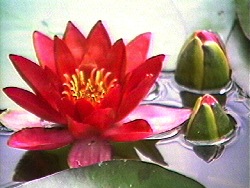Mary Lucier
Biography
In her rich exploration of light and landscape as agents of visual perception and memory, both personal and mythic, Mary Lucier reexamines 19th-century art historical and literary traditions through the lens of contemporary technology. Lucier is well known for her contributions to the form of multi-monitor, multi-channel video installation. In her elegant "pictorial-narrative" works, in which video images are set within configurations that she describes as "at once cinematic, sculptural, and theatrical," light and landscape are the essential modes of representation and metaphor.
Reinvestigating the American pastoral myth in what she terms "an ironic dialogue between past and present, mundane and poetic, real and ideal," Lucier questions collective memory and identity through an art historical vocabulary. Echoing paradigmatic motifs of 19th-century painting traditions, her metaphoric use of light to signify transcendence and her allusions to the sublime evoke Romantic and Modernist ideals. Ohio at Giverny (1983) is a poetic homage to Monet's Impressionism; Wilderness (1986) refers to the Luminists and the Hudson River School. In Lucier's works, nature is transformed by culture and technology; luminosity is synonymous with lyricism.
Lucier began working in video in the 1970s, after first exploring sculpture, performance and photography. Early works, such as Dawn Burn (1975) and Bird's Eye (1978), are empirical records of the optical effects of light on the camera's eye. Aiming a laser directly at the camera or pointing a lens at the sun, she burned the vidicon tube in real time, inscribing it with calligraphic abstractions of light. In addition to installations, she has also produced video dance works with choreographer Elizabeth Streb, exploring relationships of the human figure, sculptural movement, and landscape.
Lucier was born in 1944. She received a B.A. from Brandeis University. Among her many awards are a Guggenheim Fellowship and an American Film Institute Independent Filmmaker Grant, as well as grants from the National Endowment for the Arts and the New York State Council on the Arts. She has been artist-in-residence at the Capp Street Project, San Francisco, and the Television Laboratory at WNET/Thirteen, New York; and has taught at New York University, the San Francisco Art Institute, the Cleveland Institute of Art, Minnesota College of Art and Design, and the School of Visual Arts, New York.
Lucier has had solo exhibitions at The Carnegie Museum of Art, Pittsburgh; Wadsworth Atheneum, Hartford; Capp Street Project, San Francisco; Museum of Contemporary Art, Los Angeles; Dallas Museum of Art; Madison Art Center, Wisconsin; Greenburg-Wilson Gallery, New York; San Francisco Museum of Art; Museum of Modern Art, New York and Lennon, Weinberg, New York. Her work has also been exhibited in group shows at festivals and institutions including the American Film Institute National Video Festival, Los Angeles; Whitney Museum of American Art Biennial Exhibition, New York; Stedelijk Museum, Amsterdam; The Museum of Modern Art, New York; Artspace, Sydney; Walker Art Center, Minneapolis; and the San Francisco Museum of Modern Art. Lucier was selected as "One of the ten artists to watch in the '90s" by ARTnews magazine. In 2007 she was awarded the Skowhegan Medal for Video.
Lucier lives and works in New York.
